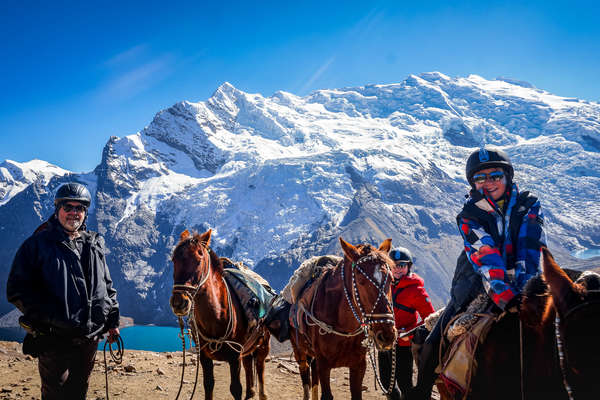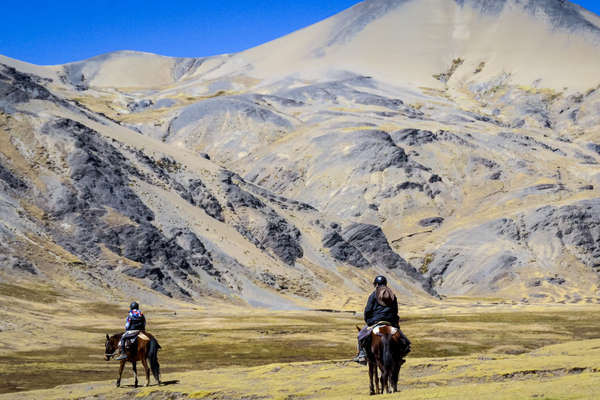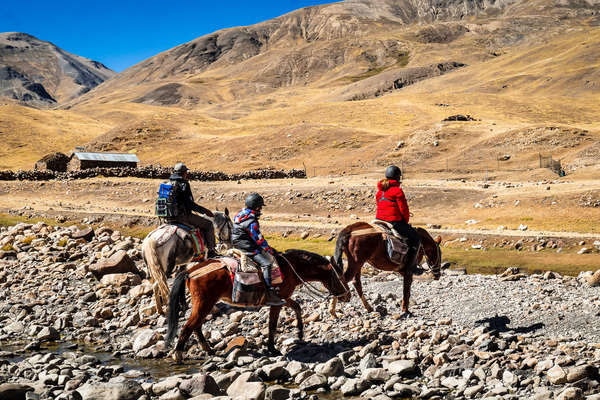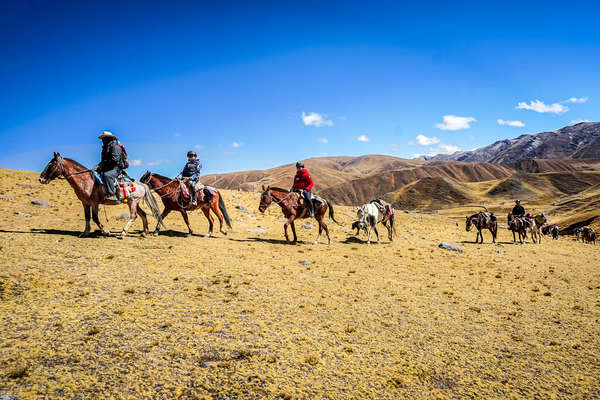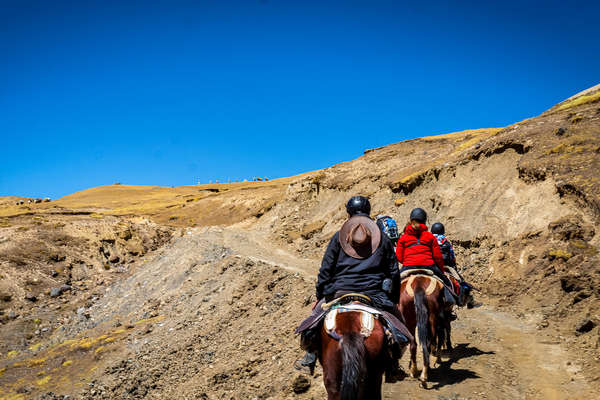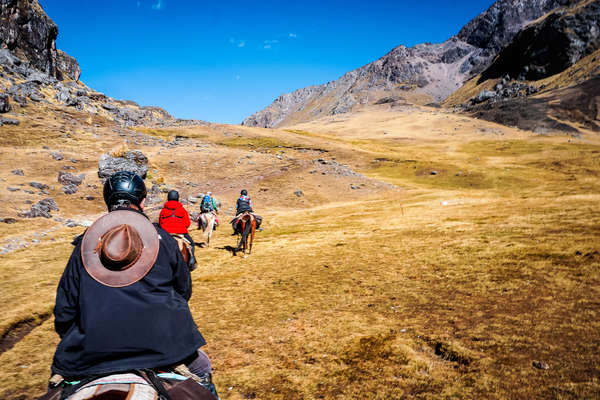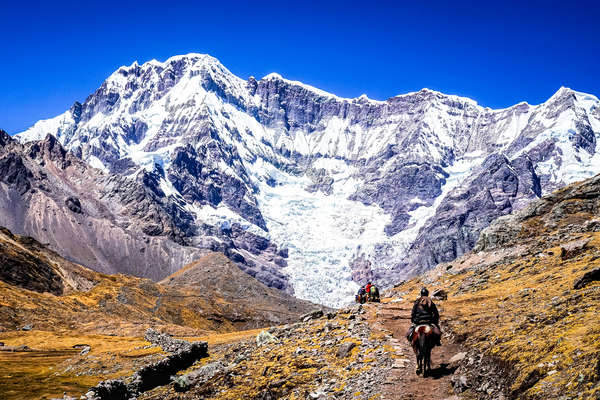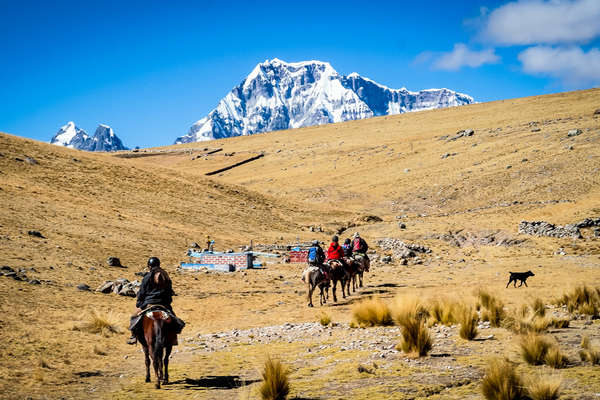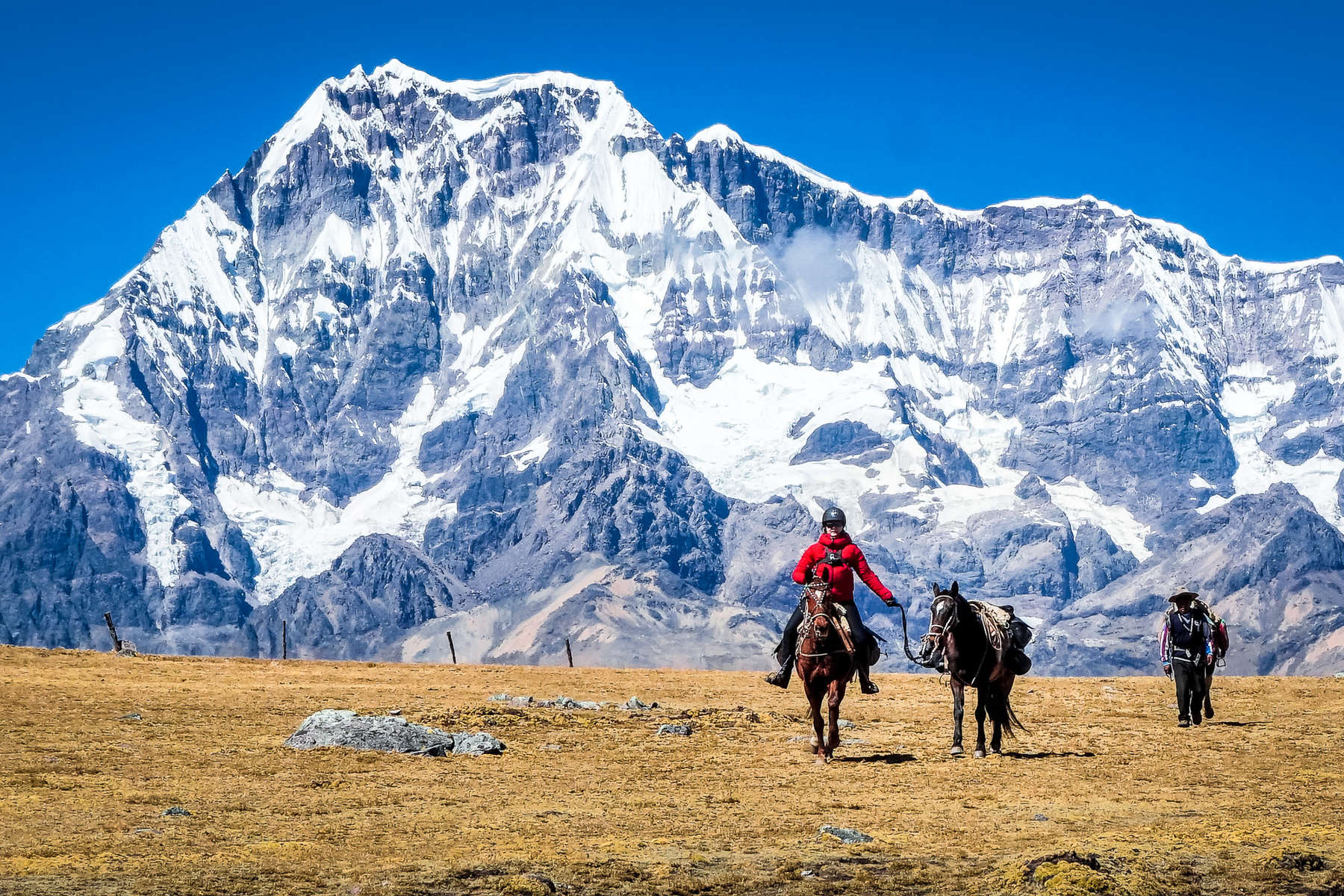
Itinerary
Highlights
- Choose to add the option of a 3 day extension to explore Lake Titicaca, its islands and stay in the home of a local
- Enjoy a trip that offers you a mix of riding and sightseeing/hiking
- Revel in the magnificence of the Andes mountains and the Sacred Valley of the Incas
- Guided and supported by a Peruvian team who are local and familiar with the mountains
- As the expedition is an exclusive ride of EJ departure dates are flexible. Do not hesitate to send us your preferred dates and we will try to organise it.
Dates & prices
Price details
- Flights to your destination (international/domestic) are not included, but can be booked on request - please contact us for rates.
- Rates are per person, based on two riders sharing a twin or double room or tent.
- Groups are composed of 6 international riders and a maximum of 10 riders, plus guides.
- Please note: the ride will also confirm for less than 6 riders on payment of a supplement. Once the group has reached 6 people, we will remove this supplement from your invoice and refund you if you have already paid it.
For 2 riders, the supplement is c. $1495 / €1405 / £1160 per person
For 3 riders, the supplement is c. $750 / €705 / £585 per person
For 4 riders, the supplement is c. $325 / €305 / £255 per person
For 5 riders, the supplement is c. $250 / €235 / £195 per person
- There is a single supplement of c. $230 / €220 / £180 if you would prefer your own room or tent.
- It is possible to extend the trip by 3 days to visit the different islands on Lake Titicaca. Prices vary depending on the group size. For two riders, it's an extra $550 / €520 / £435 per person. Please ask your travel advisor for more information.
- Young riders aged 12+ are welcome on this ride as long as they match the riding requirements.
- The weight limit for this ride is 90kgs / 14.1st / 198 lbs, heavier riders please contact us.
Please Note
The itinerary may be modified at anytime for security reasons, meteorological or events beyond our control such as blocked roads, rivers in flood, drought, strikes and local holidays. Equus Journeys, our local partners and their local guides will always strive to find the best solution and will alter the itinerary as needed.
The names of the hotels and accommodation are given for information only and depending on availability, they may be modified without notice and replaced by another of a similar standard.
Price includes
Support Team
1 local horse guide
Logistics
1 horse equipped with saddle and bridle per rider
Pack horses/mules and the team in charge of them
Inland transport
Train and bus to Machu Picchu
All transfers in a private vehicle except Aguas Calientes - Machu Picchu by bus
Accommodation
Double room in a 2 or 3* hotel
Meals
Additional equipment
Extras
Price doesn't include
Meals
Lunches and dinners in Lima and Cusco
Transport
Local airport fees from Lima (international and domestic flights)
Extras
Small group supplement. For price list see the note above in price details
Insurance
Optional
Accommodation
Equestrian info
Horses
Guide & local team
Minimum riding ability
Minimum riding ability
An experience of trail rides over several days is mandatory.
The rider weight limit is 90kgs, contact us if you weigh more than this and wish to ride
Pace
Tacking ability and participation
Trip conditions and Requested experience
The ride is at an altitude of 3,000m - 5,000m and requires you to be in good health. The weather in the mountains can be variable with cold nights (down to -10c) possible at the high altitude camps.
Visiting a new country offers the opportunity to meet other cultures with different mentalities, therefore it is important to accept these differences and respect the local way of life.
Equestrian equipment
Travel info
Comfort
On the trail, you will camp in spacious two man tents with mattresses provided. There will be a central mess tent for the kitchen/dining complete with small table and chairs.
If you choose to add the extension to Lake Titicaca on the island of Taquile, you will stay in homestay accommodation with the locals.
The hotels you stay in may differ to those shown in the itinerary depending on availability at the time of booking. All alternative hotels will be of the same standard as those listed in the itinerary.
Meals
Climate
In the heart of the Andes, the wet season runs from October to April, and the dry season from May to September. To make the most of the view and the atmosphere, the dry season is the best time to visit.
In Cusco (3,250m) temperatures can drop to as low as zero celsius in July/August, and as high as 23c in November.
In Arequipa (2,525m) temperatures can drop as low as 6c in July/August and as high as 23c in November. There is very little rainfall in this area.
Generally there are cold nights and mornings because of the altitude, but the days can be sunny and pleasant.
Tips
Packing list
Head
- Equus Journeys strongly recommend that you wear a riding helmet and that you take your own to ensure a correct fit. There are many lightweight options available nowadays
- Sunhat for when not riding
- Sunglasses - with a cord attached so they don't fly off when riding
- Buff or bandana
- Warm hat for cold nights when camping
Upper body
- Thermals (long or short sleeved)
- Long sleeved shirts provide protection from the sun and are an extra layer
- T-shirts
- Lightweight fleece or jumper
- Warm fleece or jumper
- Warm and waterproof jacket - it can rain at any time of year and the evenings can be particularly cold
Legs
- Lightweight, comfortable riding trousers or jodhpurs - we recommend riding in them at home before taking them on holiday to ensure they don't rub
- Thermals
- Casual trousers for the evenings, such as jeans or tracksuit bottoms
- Waterproof over trousers
- Lightweight, comfortable trousers for non-riding days
Hands and Feet
- Comfortable riding boots. We recommend short boots with half chaps but you may wish to take long chaps as an extra layer against inclement weather. We don't recommend taking your favourite long leather boots in case they get damaged
- Waterproof shoes/boots can be useful for abundant dew in the mornings or when it rains
- Trainers or equivalent light shoes for moving around the camp in the evenings
- Several pairs of warm, thick socks
- Gloves - your hands are particularly exposed to the sun, cold or rain whilst riding. Waterproof gloves can be particularly useful
Nightwear
- Sleeping bag. You need at least a comfort factor down to minus 15 Celsius, or minus 20 if you feel the cold.
- Sleeping bag liner - silk, cotton or fleece - adds an extra layer
- Pyjamas or tracksuits or thermals for sleeping in
Other useful items
- Swimsuit - for swimming/bathing in rivers
- Small backpack for accessing items required during the day (carried by support crew)
- Camera and high capacity memory card. Spare battery
- Bumbag for carrying your camera and small items whilst riding
- Headtorch or small torch for moving around camp at night - bring spare batteries and bulbs
- Water bottle (2 litres or 2 x 1 litre)
- Wet Wipes or equivalent (for when washing facilities aren't available)
- Toilet paper and a lighter to burn it with
- Small plastic bags for rubbish
- Ear plugs (for light sleepers)
Medical kit
- Sunscreen and lip balm - should be high factor
- Insect repellent, preferably containing deet
- Any medication you regularly take
- Blister plasters in case of any rubs
- Antiseptic cream, plasters, aspirin, anti-histamine, insect-bite salve etc...
- Spare prescription glasses/contact lenses
- Eye drops
- Imodium or similar anti-diarrhoea medication
- Re-hydration sachets
- Water purification tablets
- Antiseptic wipes
- Handwash gel
You may wish to ask your doctor for some specific medication for travelling at High Altitudes. We recommend that you discuss this directly with your doctor who is best placed to advise on your personal medical history.
In your hold luggage
- Any liquids, such as shampoo, moisturiser, deodorant unless they are less than 100ml and all bottles can fit in a small, clear, plastic ziplock bag. We recommend biodegradable washing products where possible.
- Swiss army knife (or equivalent)
In your hand luggage
- Any valuables, such as your camera, ipod, ipad etc.
- Your riding hat
Our Recommendations
- Please don't take a hard sided suitcase. Your luggage should be soft sided with a capacity of 60-80 litres. We recommend taking a backpack or similar. Remember that you are supported by pack horses/mules so please pack light.
- Backpacks cannot be worn whilst riding. We recommend a small bumbag or a coat with pockets so that you can carry small items with you during the day (camera, sunscreen, lipbalm etc)
- We recommend travelling in your riding boots and carrying your hat and some riding clothes in your hand luggage - then if your luggage goes astray you are still able to ride!
- Even if foam/floor mattress is provided, we recommend to take your own inflatable mattress.
- We recommend taking a copy of your passport and insurance documents with you in case you lose your originals
- Please take your rubbish home with you. There are no recycling facilities in Peru, so take your used batteries, aerosols etc back home and dispose of them appropriately. Try to leave excess packaging material at home before travelling
Sustainable tourism
- Travel light. It's a little known fact, but the lighter you pack, the better for the environment as heavy bags will produce higher emissions (when flying a plane or driving a car!).
- Reduce plastic waste. Take your favorite reusable bottle with you. Avoid single-use bags, cups, or straws.
- Preserve nature. Always take your rubbish with you during the ride and recycle them. Leave all the flowers or plants as you found them, and never get too close when observing wildlife. Make sure to use eco-friendly products such as body wash or laundry detergent (if camping) to protect both your skin and the environment.
- Choose your experiences carefully. Respect animal life by not participating in any activities that abuse wild animals (shows, elephant rides, etc.).
- Support local populations. Buy local handicrafts, be respectful of customs, and learn about the culture of local communities.
- Share! Raise awareness among your family and friends about sustainable tourism.
Did you know?
Did you know?
The Ausangate mountain (also known as "Apu" in the Quechua language) lies 100km south-east of Cusco in the impressive cordillera Vilcanota. The mountain range has several peaks over 6000 metres, including the sacred Ausangate (6372m) - the highest mountain in the Cusco region.
This mountain is considered a holy mountain by local Peruvians and is the deity of Cusco. Even since pre-Inca times, the mountain has been a place of worship and offerings, a tradition that still continues today. The region is inhabited by Llama and Alpaca herding communities that constitute one of the few remaining pastoralist societies in the world.
Unlike most other trail rides in the region, Ausangate is not about Inca ruins. This ride will focus in the beautiful scenery: snow peaks, glaciers and colourful mountains and lakes. It is a perfect location for those who love nature and are looking to get off the beaten track.

